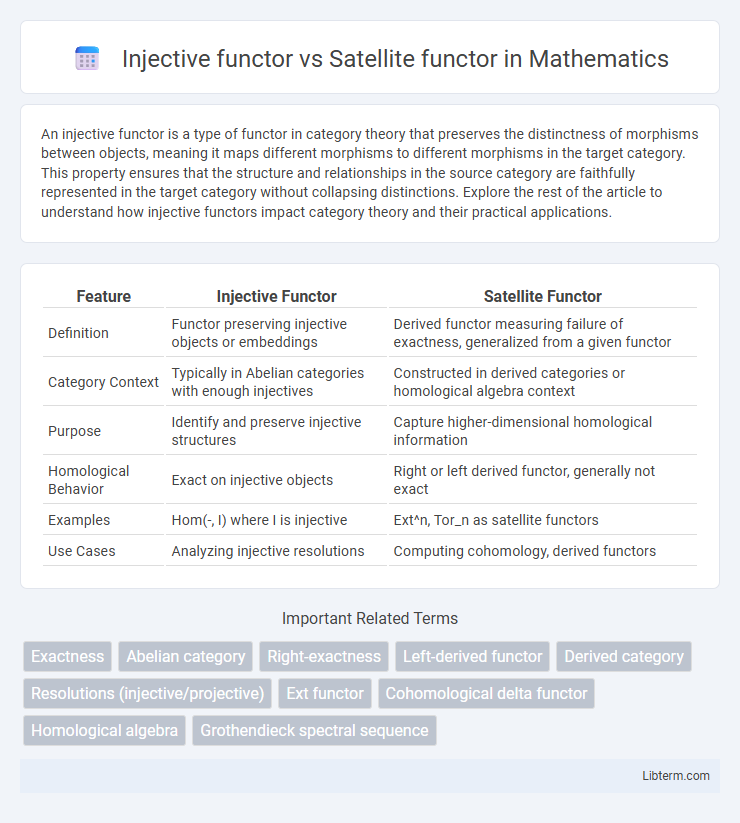An injective functor is a type of functor in category theory that preserves the distinctness of morphisms between objects, meaning it maps different morphisms to different morphisms in the target category. This property ensures that the structure and relationships in the source category are faithfully represented in the target category without collapsing distinctions. Explore the rest of the article to understand how injective functors impact category theory and their practical applications.
Table of Comparison
| Feature | Injective Functor | Satellite Functor |
|---|---|---|
| Definition | Functor preserving injective objects or embeddings | Derived functor measuring failure of exactness, generalized from a given functor |
| Category Context | Typically in Abelian categories with enough injectives | Constructed in derived categories or homological algebra context |
| Purpose | Identify and preserve injective structures | Capture higher-dimensional homological information |
| Homological Behavior | Exact on injective objects | Right or left derived functor, generally not exact |
| Examples | Hom(-, I) where I is injective | Ext^n, Tor_n as satellite functors |
| Use Cases | Analyzing injective resolutions | Computing cohomology, derived functors |
Introduction to Functors in Category Theory
Injective functors preserve monomorphisms, ensuring injective structure between categories, which plays a critical role in embedding subcategories faithfully. Satellite functors arise in homological algebra as derived functors that extend a given functor to capture deeper homological invariants, particularly in contexts like cohomology and Ext. Understanding these functors requires a foundational grasp of category theory concepts such as objects, morphisms, and natural transformations.
Defining Injective Functors
Injective functors are defined as those that preserve monomorphisms across categories, meaning they map injective morphisms in the source category to injective morphisms in the target category. This property ensures that injective functors maintain the structure of objects with respect to embeddings and subobjects, facilitating exactness conditions in homological algebra. Satellite functors, in contrast, arise as derived functors measuring the failure of exactness and do not necessarily preserve injectivity but instead extract homological information from chain complexes.
Understanding Satellite Functors
Satellite functors arise from the process of deriving functors to measure how far a functor is from being exact, providing deeper insights into homological algebra. Unlike injective functors, which preserve injectivity in categories, satellite functors capture higher-dimensional cohomological information through derived functor constructions. Understanding satellite functors involves analyzing their role in extending classical functors, such as Ext and Tor, beyond the limitations of exactness and injectivity.
Key Differences: Injective vs Satellite Functors
Injective functors preserve injective objects and often arise in the context of homological algebra, serving to extend objects functorially without losing injectivity. Satellite functors, including derived functors like Ext and Tor, generalize the notion of exactness by measuring the failure of a functor to be exact, usually constructed via resolutions such as injective or projective ones. The key difference lies in their purpose: injective functors maintain injective structure, while satellite functors capture homological information by extending functors beyond exactness constraints.
Properties and Examples of Injective Functors
Injective functors preserve monomorphisms and reflect injectivity on objects, making them essential in homological algebra for constructing injective resolutions and computing derived functors. Examples of injective functors include the Hom-functor \(\text{Hom}(A,-)\) when \(A\) is an injective object in an abelian category, as well as right adjoint functors that often exhibit injectivity properties. Unlike satellite functors, which arise from derived functors measuring the failure of exactness, injective functors maintain exactness conditions necessary for extending objects in categories with enough injectives.
Properties and Examples of Satellite Functors
Satellite functors are derived functors that generalize the concept of homological constructions beyond classical Ext and Tor, capturing higher-dimensional information about module categories, whereas injective functors specifically preserve exactness in certain exact sequences. Key properties of satellite functors include their ability to detect non-trivial extensions and cohomological dimensions, often constructed via injective or projective resolutions in abelian categories. Examples of satellite functors include the right satellites of a left-exact functor, such as the Ext functor derived from Hom, which measures extensions of modules, illustrating their crucial role in homological algebra.
Applications in Homological Algebra
Injective functors play a crucial role in homological algebra by preserving exactness in injective resolutions, enabling the computation of right derived functors such as Ext and local cohomology. Satellite functors generalize derived functors by capturing higher order information about non-exact functors, often constructed via injective or projective resolutions, which are essential in defining Ext and Tor functors. Applications include calculating invariants of modules and sheaves, analyzing extensions, and studying spectral sequences arising from filtered complexes.
Relationships with Other Types of Functors
Injective functors are closely related to exact functors, as they preserve monomorphisms and often appear in the context of injective objects in abelian categories, ensuring the extension of morphisms. Satellite functors arise as derived functors, capturing cohomological information beyond exactness and revealing deeper relationships through long exact sequences. Both types of functors interact with projective and flat functors, linking them within homological algebra frameworks and facilitating the study of extensions, kernels, and cokernels in complex categories.
Comparative Table: Injective vs Satellite Functors
Injective functors preserve monomorphisms and often arise as right adjoints in functor categories, ensuring exactness in derived functor computations. Satellite functors, on the other hand, extend cohomological constructions by generalizing derived functors outside classical settings, capturing higher-dimensional homological information. The comparative table highlights key differences: injective functors maintain exact sequences and limit preservation, while satellite functors focus on constructing cohomological invariants and detecting obstructions in homological algebra.
Conclusion and Further Reading
Injective functors preserve exact sequences and play a crucial role in homological algebra, especially in constructing injective resolutions essential for computing right derived functors. Satellite functors generalize derived functors by systematically capturing higher-order extensions and cohomological information beyond exactness. For further reading, exploring texts such as Weibel's "An Introduction to Homological Algebra" and Cartan-Eilenberg's "Homological Algebra" offers comprehensive insights into the interplay between injective and satellite functors in category theory.
Injective functor Infographic

 libterm.com
libterm.com